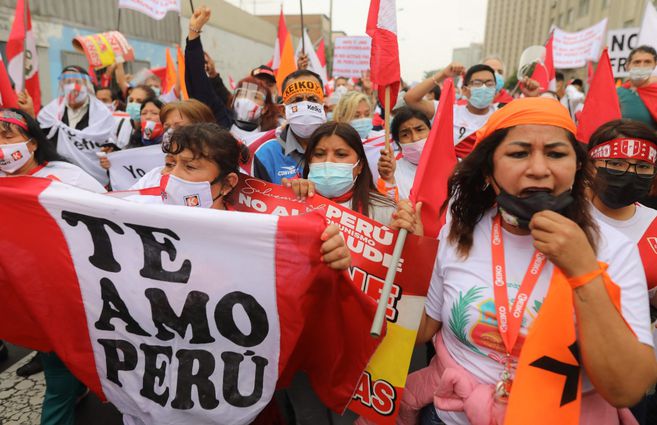16 hours ago
Uncertainty continues in Peru: Pedro Castillo holds a slight advantage over Keiko Fujimori in scrutiny already at 99.935%. The delay is due to the review of 56 electoral records, which, according to Fujimori’s candidate, will be evidence of fraud.
Another week Peru still does not know the name of the winner of the second round of elections in which the country’s new president was elected. Although the National Office for Electoral Operations (ONPE) reported that ballot numbers reached 99.935%, with 49,420 votes cast for Castillo over Fujimori, it is not possible to declare a winner yet.
According to the data, the Peruvian Liber Party candidate, Pedro Castillo, has received 8’833,185 votes so far, while the Forza People’s Party candidate has received 8’783,765 votes, accounting for 50.14% and 49 86% of the votes, respectively. .
You may be interested in: Peru has become the epicenter of the geopolitical battle in Latin America, says Gonzalo Banda, a Peruvian analyst
The small percentage of votes, already processed but not yet counted, consisted of 56 minutes that still had to be reviewed by the National Elections Jury (JNE) for material error, objection, or lack of signatures, among others. things.
However, its 100% conclusion will not mean the immediate announcement of the winner of the election, as all requests to cancel the transcripts to be reviewed, most of which were promoted by Fujimori, still need to be awaited after his conviction. They wanted to commit “table fraud” during the polls.
“There is a lot at stake: who is the winner at a time when the distance is so short we don’t know for sure how many votes have been answered. […]Analyst Sonia Goldenberg told AFP that the legitimacy of the electoral process was at stake.
“There is a feeling on both sides that the national election arbitral tribunal is not reliable and this is dangerous in such a situation and we don’t know whether the two candidates will accept the result or not,” he added.
Unpronounceable word: fraud
JNE, which is reviewing the Electoral College (ONPE) scrutiny and declaring the winner, is under pressure from supporters of both candidates, who demonstrate daily outside its headquarters in downtown Lima.
You may be interested in: Peru Keys to Elections Without Official Results
Peruvian Nobel laureate Mario Vargas Llosa, who supports Fujimori of Spain, said this Sunday that the JNE is “the ultimate and only authority that should declare itself” over the legality of audits and appeals, in an interview with the n . channel from Lima.
The writer, who has been anti-Fugimori in the past, said JNE should assess Fujimori’s challenges, but was cautious about his allegations of “fraud.”
“The word fraud is a very dangerous word […]Perhaps it would be wise, while JNE does not speak, not to use the word fraud.” “Fail […]Whoever it is, it will be severely criticized.”
What will happen
Amid the political tension facing the country, the newspaper trade He stressed, on Sunday, that the events that occurred during the days following the second round “caused enormous damage to the fragile national institutions.”
An effective ONPE count – with regular public updates – was not enough to protect the electoral process from criticism. With these stringent results (…) the integrity and institutional solvency of the system were tested, and its response was incomplete.”
You may be interested in: Peru, an electoral class struggle?
For this reason, he stressed, “the authorities, candidates and supporters today must act with utmost responsibility,” because “in the current scenario, the consequences of not doing so are incalculable.”
For journalist and analyst Augusto Alvarez Rodrić, this confrontation “between many of the half against many of the other half of the country … leaves the flavor of the class struggle contained, but the elections revealed.”
And in an article published in La Repubblica, he considered that this situation “will not stop even when ONPE finishes counting the votes in a few? weeks, and no date for the start of the new presidency on July 28.”

“Music buff. Social media lover. Web specialist. Analyst. Organizer. Travel trailblazer.”

:quality(85)/cloudfront-us-east-1.images.arcpublishing.com/infobae/TEQF6EONZRFGLLLDIDD4L2O4EE.jpg)

:quality(75)/cloudfront-us-east-1.images.arcpublishing.com/elcomercio/XU32LRAEZFDDPNVHLFU3CKVBYY.jpg)



More Stories
Sheinbaum, Galvez, Mainz campaign wrap-up, news and more
Sheinbaum and Mainz’s CDMX campaign wraps up: Road Alternatives and Street Closures
Ortega attacks Humberto Ortega and declares him a “traitor to the country”